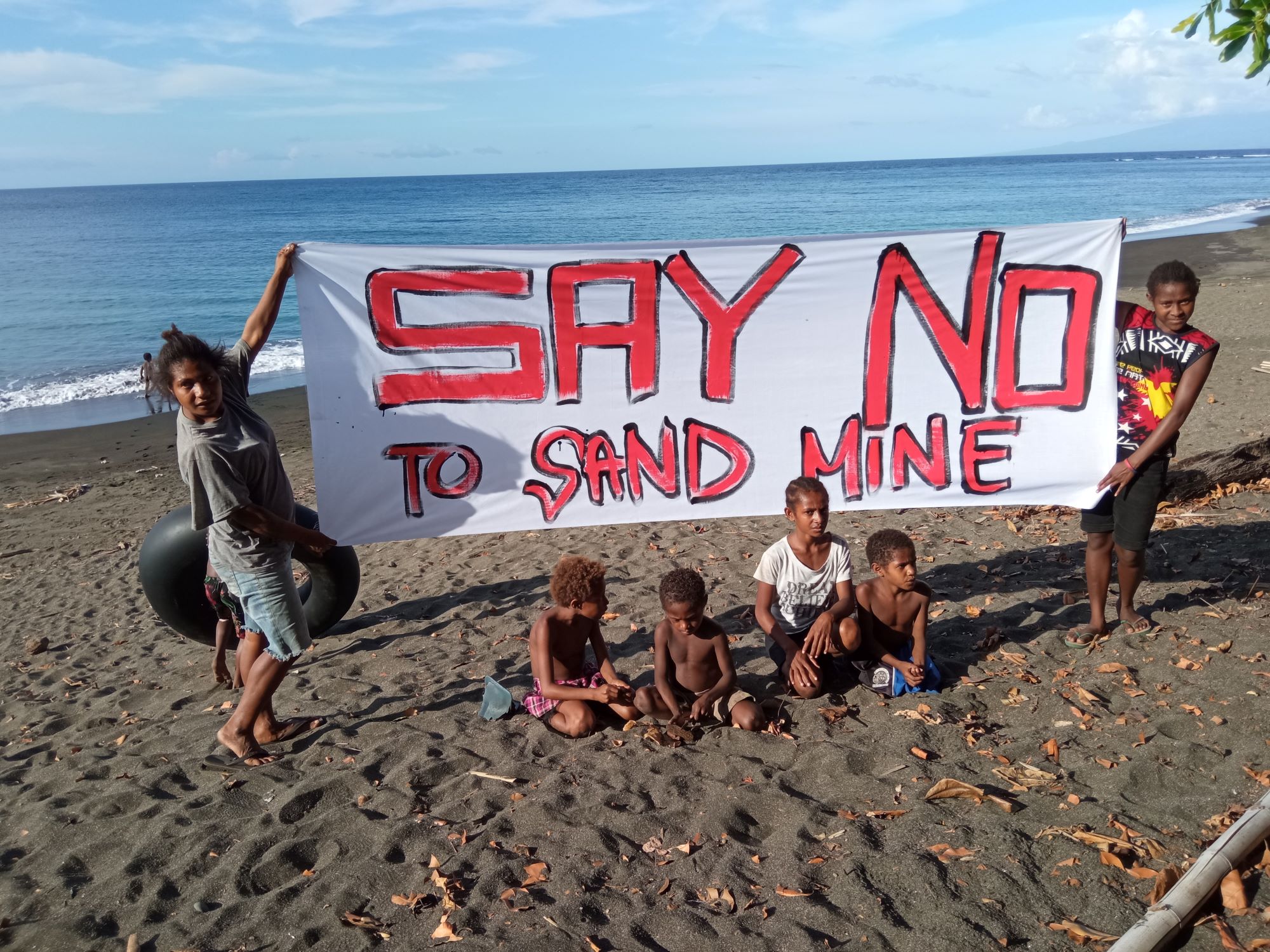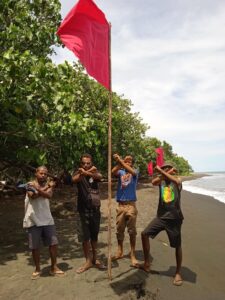
In the Madang province in Papua New Guinea, leatherback sea turtles have been an important part of the ecosystem for thousands of years. Communities in Madang where the leatherback sea turtles come to nest have for generations lived alongside them and depended on them as a sacred food source. Recently, Global Greengrants Fund grantee partner MAKATA worked with those local communities to save the populations of critically endangered Leatherbacks and other sea turtles from a new emerging threat—sand mining. Globally, sand mining is responsible for the extraction of more than 50 billion tons of sand from riverbeds, coastlines, and more per year and used for concrete, asphalt, and other materials to build the world’s cities, according to the United Nations Environment Programme.
MAKATA (short for Mas Kagin Tapani Association which means “Sea Guardians Association” in English) aims to ensure that endangered leatherback sea turtles and other endangered sea turtles and their marine resources in the Bismarck Seas are saved, protected, restored, increased, and sustained in ways that also improve the livelihoods of local inhabitants that share their beaches with the sea turtles. This includes by preventing critical ecosystem, marine habitat, and biodiversity loss, securing food sources for local communities, and sustaining cultures.
In 2020, MAKATA discovered that a Singaporean company, Niugini Sands Limited, applied to Papua New Guinea’s Mineral Resources Authority (MRA) for a license allowing it to pursue sand mining in the Sumgilbar Local Level Government (LLG) area, where MAKATA’s Sea Turtles Restoration Project sites are located. The proposed mining area from Murunas to Malas covered a length of 51km and would impact a community of more than 10,000 villagers, including girls, women, youths, the old, and people living with disabilities, in addition to having detrimental impacts on the already fragile population of leatherback and other endangered sea turtles.
MAKATA foresaw that if Niugini Sands Limited successfully established its mine, it would have numerous deep and lasting impacts on the people and environment in Sumgilbar Local Level Government (LLG) area. This includes:
- The relocation of coastal villagers inland where there is already a shortage of land.
- A huge level of destruction to local inhabitants’ food, protein, cultural heritages, spirituality, education, aesthetic, medicinal, entertainment, and economic sources both on land and below the sea.
- Poverty and social problems for the local inhabitants and outsiders that benefit from these natural resources.
- Marine ecosystem, biodiversity, and habitat loss and destruction.
- Degradation of land, including disturbance to the water table that would lead to severe ecological imbalance and damage to land use patterns in and around mining regions.
- The removal of sand that provides a buffer and protection from storm surges for communities along the coast.
MAKATA used a $5,000 grant from Global Greengrants to push back. More than 5,000 villagers representing more than 10,000 local inhabitants within the Sea Turtles Restoration Project sites and in the neighboring villages in Sumgilbar Local Level Government area stood in solidarity and fought off this new sand mining threat. The grant helped MAKATA raise awareness in-person among local communities and key stakeholders like the Madang Chamber of Commerce, and to advocate for local and national media attention.

When MAKATA heard that the MRA Tenement Manager/Registrar planned to hold a hearing considering Niugini Sands Limited’s application, MAKATA wrote letters of objection asking the MRA Tenement Manager/Registrar to defer their decision of the application until they had conducted further investigation and hearings. They also copied the letters to environmental government officials and wrote the Attorney General a letter making the same request.
When the government requested that the MRA hold on approving the application until they’ve had a chance to develop government policy on proposals to mine and export sand, Niugini Sands Limited withdrew its application, a major victory for MAKATA and the people of the Sumgilbar Local Level Government (LLG) area.
By preventing the establishment of sand mining in the area, MAKATA protected the natural resources, businesses, tourism and hospitality services, and the environment including existing households, infrastructures, food gardens, coconut, cocoa, vanilla, and other cash crops, schools, health centers, roads and bridges and other, social, economic, and infrastructure services which would have been totally destroyed. They also provided key education to local communities about the power of strategic collective organizing to oppose the encroachment of extractive capitalist industries on indigenous land.
MAKATA is currently working in partnership with the Center for Environmental Law and Community Rights (CELCOR), a local NGO, to write a sand mining regulation policy that they will present to their government. The policy will make it clear that local Papua New Guinea communities must give free and prior informed consent to activities that impact them, and that there must be regulations and clear guidelines and standards set to curb irresponsible and illegal extraction of sand and protect the people of Papua New Guinea today and for generations to come.
